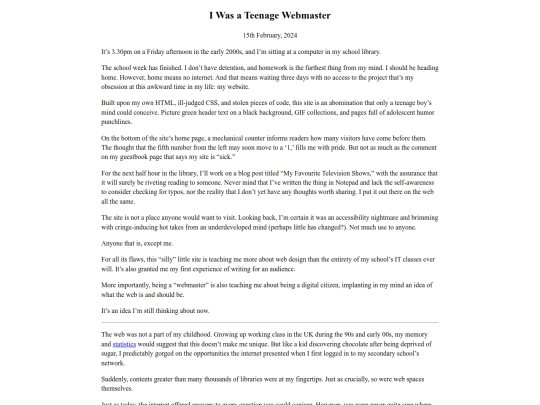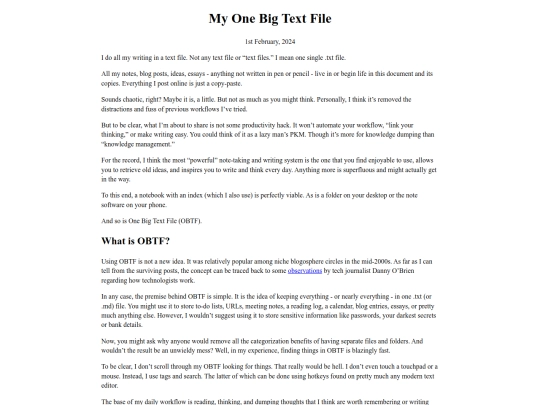Neocities.org

 mikegrindle
1 year ago
mikegrindle
1 year ago
Thanks! That's a fun problem to have. I think go with whatever feels easiest to you.
 kph
1 year ago
kph
1 year ago
If nothing else, this got me to pick up an old messy draft and get it good enough to post. I've been wanting to get back into blogging but keep starting never finishing. So thanks for the poke.
 kph
1 year ago
kph
1 year ago
Fun read! A more intentional take on something I've done for years: when I have a lot of stuff to do or need to take notes very quickly, I will forsake any actual note system I have to open up notepad and just start typing. There really isn't anything else with so little friction. I have lost information from forgetting to save, so I've started trying to copy things to named .md files in obsidian ASAP, though.
 mikegrindle
1 year ago
mikegrindle
1 year ago
Thanks KPH. Yeah, for me it was just about combining that kind of immediacy with some of the benefits that come with PKM. I'm sure the more complex systems work wonders for many, but they didn't do much for me.
 getoffmylawn
1 year ago
getoffmylawn
1 year ago
This was a great read and I'm going to research how to add tags to my text file. I've tried before without adding tags before and search was difficult. I would love to find an example online to help.
 nohappynonsense
1 year ago
nohappynonsense
1 year ago
@getoffmylawn you can just write the tags in using your own nomenclature or system. I use something like [STORY IDEA] as a tag and then i can just ctrl+f for that and find those tags. You can do this for dates, keywords, tags, anything. The search function is extremely powerful, most folks just underutilize it
 mikegrindle
1 year ago
mikegrindle
1 year ago
Thanks, @getoffmylawn. I might do a follow-up with some examples since there seems to be a surprising amount of interest. But essentially, I just use the '@' sign as a "tag". Some people use colons, caps, hastags, brackets etc.
 mnemonics
1 year ago
mnemonics
1 year ago
Great post! And I completely agree, I created my website with the exact same idea in mind.
 kaa
1 year ago
kaa
1 year ago
Good eye. Dusk OS has been under heavy development for the past few months. The mailing list is very active. Virgil Dupras has recently put in a lot of effort in improving the emulation layer. The makefile in the root directory now works with no frills. Regardless of any theories of impending catastrophe, I think Dusk OS in particular is a marvelous project. It's the first real shot at a Forth Operating System.
 mikegrindle
1 year ago
mikegrindle
1 year ago
Thanks! I noticed there was a lot of sensationalized stuff out there on these systems. Articles either made the developer look like a loon or made-out that the system was built for nuclear apocalypse. So I wanted to offer a more no-frills, down-to-earth analysis. Happy to see the project is still moving forward.




















































































































































Having some set of ideal circumstances for writing always turned it into a massive timesink that had to compete with my social life and other hobbies. Maybe writing focused at a desk is most productive, but allowing myself to write in bits and pieces standing on the subway, waiting for meetings to start, while eating etc. has allowed it to become a far more integral part of my life, something i'm always doing.
Of course, if writing is your primary job, then it makes sense that it would be ritualized -- just like any other job one has to do every day for multiple hours.
There was a great zen pencils covering this topic, ironically with a Bukowski quote used as the prose/narration. The comic was removed at the request of Bukowski's publisher, but someone else still has the comic up: https://ravenvinnie.wordpress.com/2014/08/13/one-of-my-favorite-comics-charles-bukowski-air-light-time-and-space-by-gavin-zen-pencils-aung/
@nohappy Love that Bukowski quote/poem. @saddleblasters, work certainly changes things but I think the principle of just getting on with it still applies.